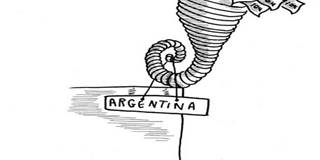The recent ruling by a US federal judge ordering Argentina to pay its holdout bondholders presents its government with a political, economic, and legal dilemma. Unless Argentina puts forward an alternative payment proposal, the US Court of Appeals will have to choose between the holdouts’ “all” and Argentina’s “nothing.”
BUENOS AIRES – Argentina is in a quandary. Prior to its 2005 sovereign-debt exchange, its legislature enacted a “lock law,” which barred the way to any future offers to holders of bonds on which Argentina defaulted in 2002. While the lock law helped to boost the participation rate in the 2005 exchange, holdout creditors remained, and have pursued litigation to force repayment.
In late November, Thomas Griesa, a United States federal judge in New York, ordered Argentina to deposit the $1.33 billion owed to holdouts into an escrow account by December 15. Griesa lifted the stay on his order from February 2012, following indications from Argentina’s government that it intended to ignore the ruling – including public statements calling the holdouts “vulture funds” and a vow by President Cristina Fernández de Kirchner never to pay. The ruling, pending appeal, leaves Argentina with three options: violate its own law, violate US law, or default again.
In his ruling, which was based on the pari passu (“equal footing”) clause included in the bonds, Griesa included the Bank of New York Mellon (the bondholders’ trustee) among entities that act “in active concert and participation” with Argentina, and cautioned it against transferring funds if Argentina ignores the order. As a result, if Argentina chooses to pay exchange bondholders as usual, BNY Mellon may refuse to transfer the funds, triggering a technical default.



BUENOS AIRES – Argentina is in a quandary. Prior to its 2005 sovereign-debt exchange, its legislature enacted a “lock law,” which barred the way to any future offers to holders of bonds on which Argentina defaulted in 2002. While the lock law helped to boost the participation rate in the 2005 exchange, holdout creditors remained, and have pursued litigation to force repayment.
In late November, Thomas Griesa, a United States federal judge in New York, ordered Argentina to deposit the $1.33 billion owed to holdouts into an escrow account by December 15. Griesa lifted the stay on his order from February 2012, following indications from Argentina’s government that it intended to ignore the ruling – including public statements calling the holdouts “vulture funds” and a vow by President Cristina Fernández de Kirchner never to pay. The ruling, pending appeal, leaves Argentina with three options: violate its own law, violate US law, or default again.
In his ruling, which was based on the pari passu (“equal footing”) clause included in the bonds, Griesa included the Bank of New York Mellon (the bondholders’ trustee) among entities that act “in active concert and participation” with Argentina, and cautioned it against transferring funds if Argentina ignores the order. As a result, if Argentina chooses to pay exchange bondholders as usual, BNY Mellon may refuse to transfer the funds, triggering a technical default.